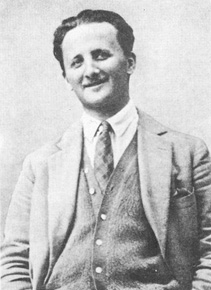
Emilio Lussu was a Sardinian and Italian writer, anti-fascist intellectual, military officer, partisan, and politician. He is also the author of the novel One Year on the High Plateau. Lussu was elected multiple times to Parliament, serving as a member of the Constituent Assembly of Italy for the constituency of Cagliari and twice as a minister. He founded the Sardinian Action Party and co-founded the Justice and Freedom movement. As an anti-fascist, he was assaulted, wounded, and sent to confinement to Lipari in the Aeolian Islands by the Italian fascist regime as a direct decision of Benito Mussolini. After escaping, with Carlo Rosselli and Fausto Nitti, he spent about fourteen years as a refugee abroad. He served as an officer in World War I, where he received multiple decorations, and participated in the Spanish Civil War as a political leader and in the Italian Resistance.

Gaetano Salvemini was an Italian socialist and anti-fascist politician, historian, and writer. Born into a family of modest means, he became a historian of note whose work drew attention in Italy and abroad, particularly in the United States, after he was forced into exile by Benito Mussolini's Italian fascist regime.

Giacomo Matteotti was an Italian socialist politician and secretary of the Unitary Socialist Party (PSU). He was elected deputy of the Chamber of Deputies three times, in 1919, 1921 and in 1924. On 30 May 1924, he openly spoke in the Italian Parliament alleging the fascists committed fraud in the 1924 general election, and denounced the violence they used to gain votes. Eleven days later, he was kidnapped and killed by the secret political police of Benito Mussolini.

Ferruccio Parri was an Italian partisan and anti-fascist politician who served as the 29th Prime Minister of Italy, and the first to be appointed after the end of World War II. During the war, he was also known by his nom de guerreMaurizio.

The Aventine Secession was the withdrawal of the parliament opposition, mainly comprising the Italian Socialist Party, Italian Liberal Party, Italian People's Party and Italian Communist Party, from the Chamber of Deputies in 1924–25, following the murder of the deputy Giacomo Matteotti by fascists on 10 June 1924.

Filippo Turati was an Italian sociologist, criminologist, poet and socialist politician.
The Action Party was a liberal-socialist political party in Italy. The party was anti-fascist and republican. Its prominent leaders were Carlo Rosselli, Ferruccio Parri, Emilio Lussu and Ugo La Malfa. Other prominent members included Leone Ginzburg, Ernesto de Martino, Norberto Bobbio, Riccardo Lombardi, Vittorio Foa and the Nobel-winning poet Eugenio Montale.

Giustizia e Libertà was an Italian anti-fascist resistance movement, active from 1929 to 1945. The movement was cofounded by Carlo Rosselli, Ferruccio Parri, who later became Prime Minister of Italy, Emilio Lussu, Sandro Pertini, who became President of Italy, and other Italian anti-fascist refugees.
Francesco Fausto Nitti was an Italian journalist and fighter against fascism. His father Vincenzo (1871–1957) was an evangelical preacher of the Italian Methodist Church, his mother was Paola Ciari (1870–1932).

Concentrazione Antifascista Italiana, officially known as Concentrazione d'Azione Antifascista, was an Italian coalition of anti-fascist groups which existed from 1927 to 1934. It was formed in Paris on 27 March 1927 with the purpose of the organization of Italian antifascist forces in order to reorganize the anti-fascist movement abroad avoiding to repeat the old divisions existing in Italy before the establishment of the regime. The CAI made a public appeal signed by Claudio Treves and Giuseppe Emanuele Modigliani (PSLI), Pietro Nenni and Angelica Balabanoff (PSI), Fernando Schiavetti and Mario Pistocchi, Bruno Buozzi and Felice Quaglino (CGdL) and by Alceste De Ambris. Communists remained outside along with liberals, populars and others in order to keep contact with Italian masses "in their social defence and political resistance moves". The official weekly newspaper La Libertà was created on 1 May 1927 with Claudio Treves as director.

Claudio Treves was an Italian politician and journalist.

Sabatino Enrico 'Nello' Rosselli was an Italian Socialist leader and historian.

Jean Paul Robert Filiol was a French militant, who was active in La Cagoule before the Second World War. After the war, he fled to Spain, where he worked for the local office of L'Oréal.
Cesare Rossi was an Italian fascist leader who later became estranged from the regime.
The Mazzini Society was an antifascist political association, formed on a democratic and republican basis, situating itself within the tradition of the Risorgimento, and created in the United States by Italian-American immigrants in the late 1930s. It was named after Giuseppe Mazzini, a leading figure of Italian reunification in the mid-19th century, who had worked from exile.
Aldo Garòsci was an Italian historian, socialist, anti-fascist activist-politician and, in his later professional career, a leading political journalist-commentator.
Italo Oxilia (1887–1971) was an Italian antifascist. He used his skills as a boat captain to help members of the Italian Resistance to flee the country and to transport Italian republican volunteers to the Spanish Civil War.
Riccardo Bauer (1896–1982) was an Italian anti-fascist journalist and political figure. He was one of the early Italians who fought against Benito Mussolini's rule. Due to his activities Bauer was imprisoned for a long time and was freed only after the collapse of the Fascist rule in 1943.

Alberto Cianca was an Italian journalist and anti-fascist politician. He edited several significant publications, including Il Mondo, and served in the Parliament and Senate.
Giustizia e Libertà, also known as Quaderni di Giustizia e Libertà, was an Italian anti-Fascist publication that was founded by the members of an anti-Fascist movement with the same name established in Paris. The magazine existed between May 1934 and May 1940. Its subtitle was Movimento unitario per l’autonomia operaia, la repubblica socialista, un nuovo umanesimo.













